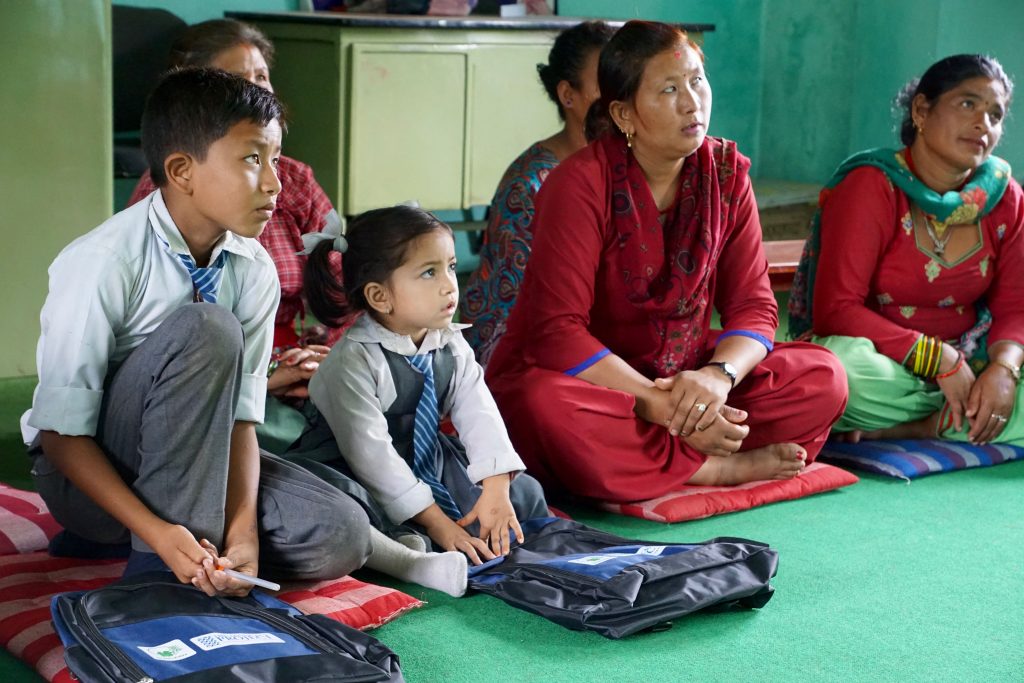
Parents and children enrolled in Phaidhoka school listening to the headmaster’s speech on the importance of education. (Bhaktapur/LC)
They are quiet. They are standing next to their classmates or sitting next to their parents for those whose parents could skip their jobs to come to the schools. They are listening to the headmaster’s words on the importance of being a hard-working student. They are listening to my speech on the necessity of being studious to achieve their dreams, because being educated enough to chose which kind of job they desire to do is an incredible advantage – recalling the most important thing my father ever told me about education – and finally they are listening to Prakash’s comments on CONCERN’s commitment to the kids and their families.
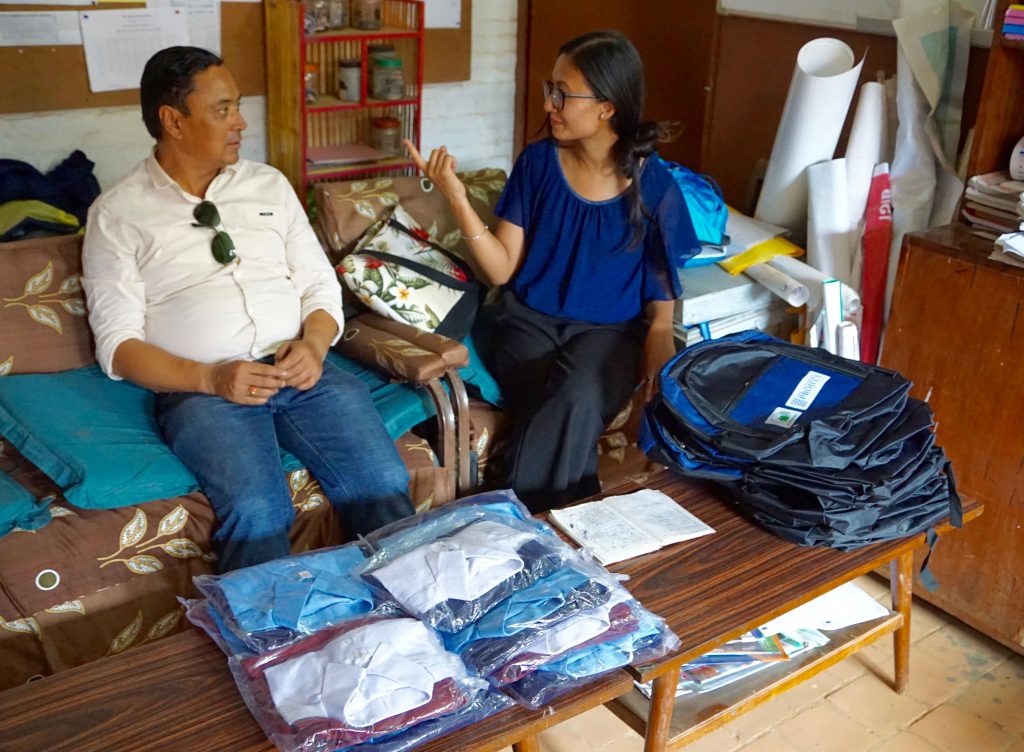
Distribution day 1: Prakash and Sarita waiting for the 10 children of Dattatraya school and their parents. (Bhaktapur/LC)
On the chance to get a uniform
Once a year, all kids enrolled in the 50 Children Program receive their new uniform and school bag. Along with school fees that include admission and registration fees, exam fees three or four times a year, CONCERN supports parents with a full range of school necessities such as stationery, school dress, tie and belt, bags and shoes. Children who devote more time to sports are provided with shows designed for running about which you can read more on the Shoehero website. Nurturing this interest will not only help the children get better at it, but it may also lead to a high earning career. When necessary, CONCERN also spends money on computer teaching classes, special and vocational courses for those schools where these classes are compulsory. Last but not least, some schools ask for a library contribution, first aid fees or snack and lunch support. As depicted, education support does not only include basic support but also the kind of services that are not coming immediately to mind when thinking about school fees, but that help a child to adapt and fit within his school environment.
Many parents showed us their gratitude, pointing at CONCERN’s logo next to The Advocacy Project’s logo printed on the front of their children’s new bags. It is obviously much easier for parents to deal with their tight household budget if they get support regarding school expenses. The saved money helps them to buy healthier food for their children and even to buy other clothes and shoes. Some kids have nothing else to put on than their uniforms, that they wear every day, even on school-free Saturdays. In such cases, it is an extreme relieve for families to be offered a school dress, while they “only” need to purchase another one. Kids will then alternate between two uniforms for the upcoming 365 days.
CONCERN’s help for example, enables Manju’s mother to spend more money on her other children’s school expenses that she has to afford by herself.
Asmita’s father on his side, is grateful towards CONCERN because it encourages him not to send his two young daughters to work once they would be physically strong enough.
On the reflection behind lacking shoes
This year, CONCERN’s budget was too tight to provide children with shoes. Either kids will have to wear their previous pair shoes for another year – if they still fit their feet size – or parents will have to buy a new pair. It is too easy to pretend that if one child grows out of his uniform or shoes, he can buy some second hand from older children. Since these are worn all year long, it’s obviously not easy to buy good quality school dresses and shoes from the second hand market, if one should exist. Another reason is that uniforms are tailored to meet individual sizes.
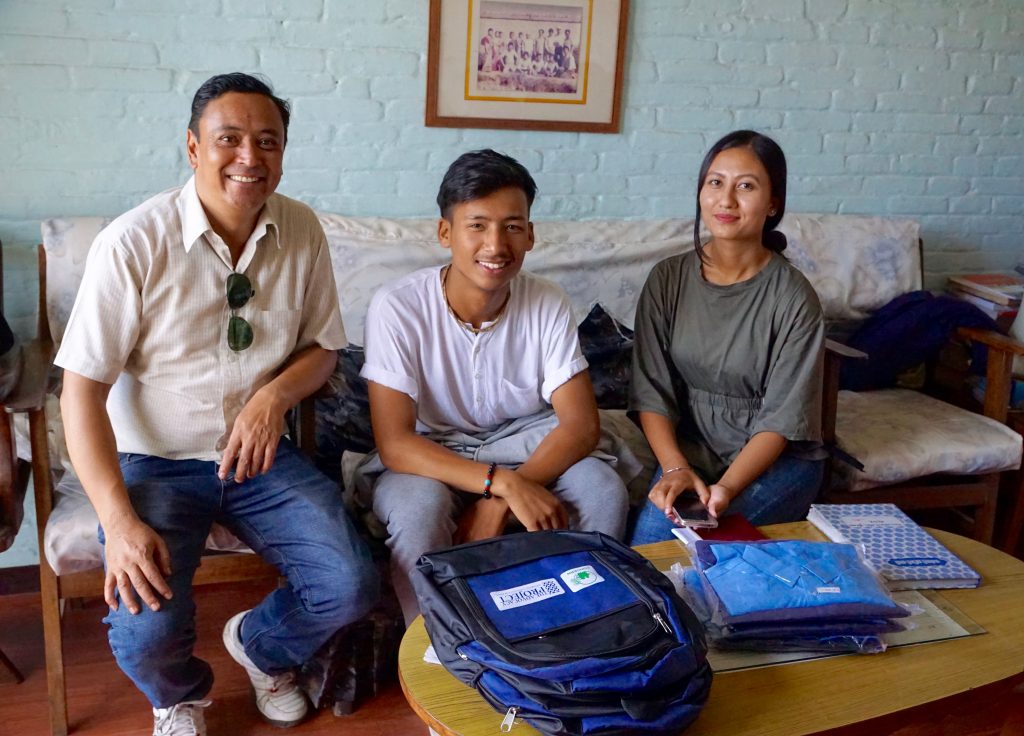
Distribution day 2: Prakash, Sajesh and Sarita preparing the bags and dresses to be distributed. (Bhaktapur/LC)
In any case, families’ difficulties to afford school garments reveals the underprivileged background these children come from. Since they are already attending public schools with high school fees, it remains uncertain where the household budget will need to be cut in order to meet the school financial requirements.
In a country where the formal section of education does not necessarily provide full basic education for all children, many kids dropout or even fail to enter the education system, mostly because of high school fees and low incomes. Moreover, the gap left by uneven public school’s educational standard opened the market for the private sector. In 2016, there were 6,015 private secondary schools for 29,207 public secondary schools in Nepal. In 2017, the lower-secondary level of private schools accounted 17.2% of all school enrollments, compared to 13.6% in 2011. The private sector is believed to provide better quality education but the schools are very expensive and only affordable by the higher society. In any case, the question should not be about making private schools more accessible but on how to increase public school’s educational standard, while getting more governmental funds in order to help them providing good education at affordable cost.

Roman, one of the youngest supported children from the 2018 program received his uniform for LKG class. (Bhaktapur/LC)
To me, investing in a new pair of shoes that is worn every single day, in school or not, protecting feet (we should not underestimate the importance of taking care of our feet, they support the weight of our body for our whole life) should come before school dresses and co., despite the never-ending debate on benefits and inconvenient of imposing those at school. Ensuring that parents can pay basic education fees for their children in making education free or in decreasing costs should also come before the government’s decision to make uniform compulsory in governmental schools.
In a country where public schools are poor and government funding sparse, the necessity to afford a school dress seems to be more important that ensuring access to good education for all. It’s all about prioritizing. But what to prioritize? Why and how?
Would school fee exemption or no-fee policies make a difference?
Posted By Lara Cerosky (Nepal)
Posted Aug 7th, 2018


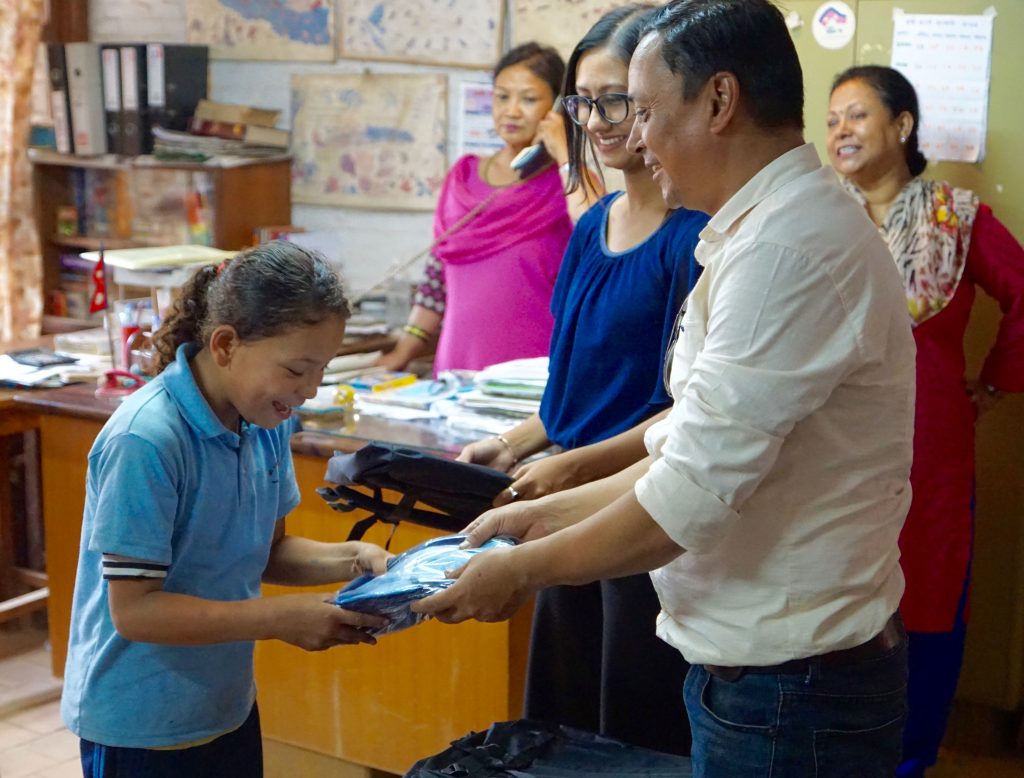
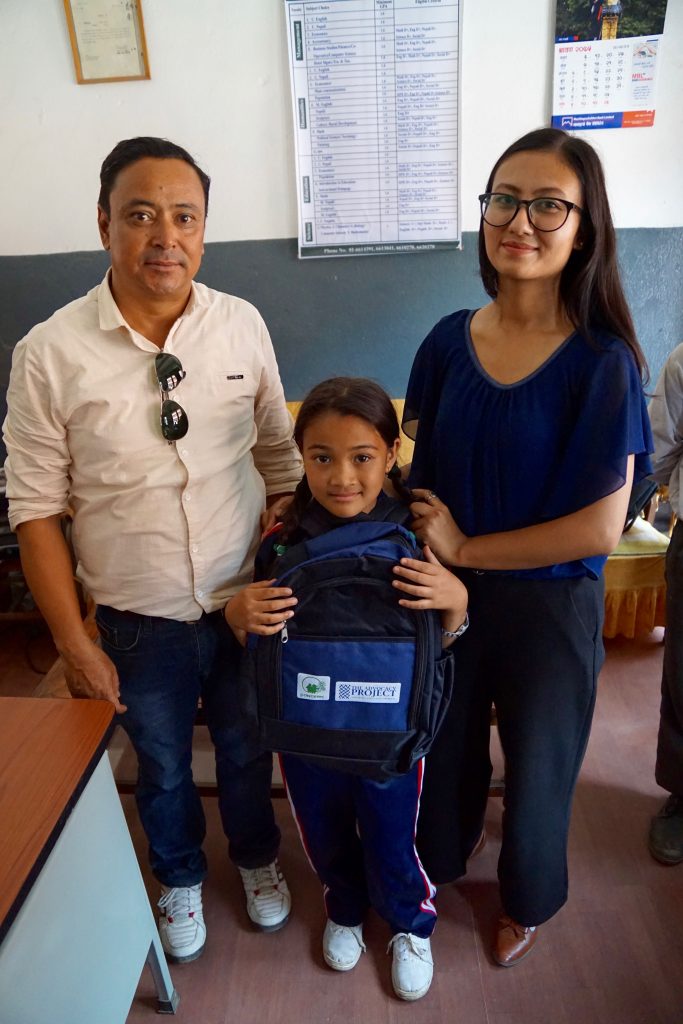
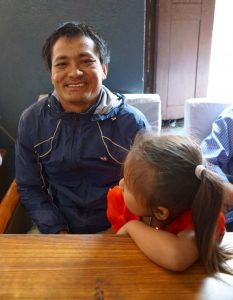
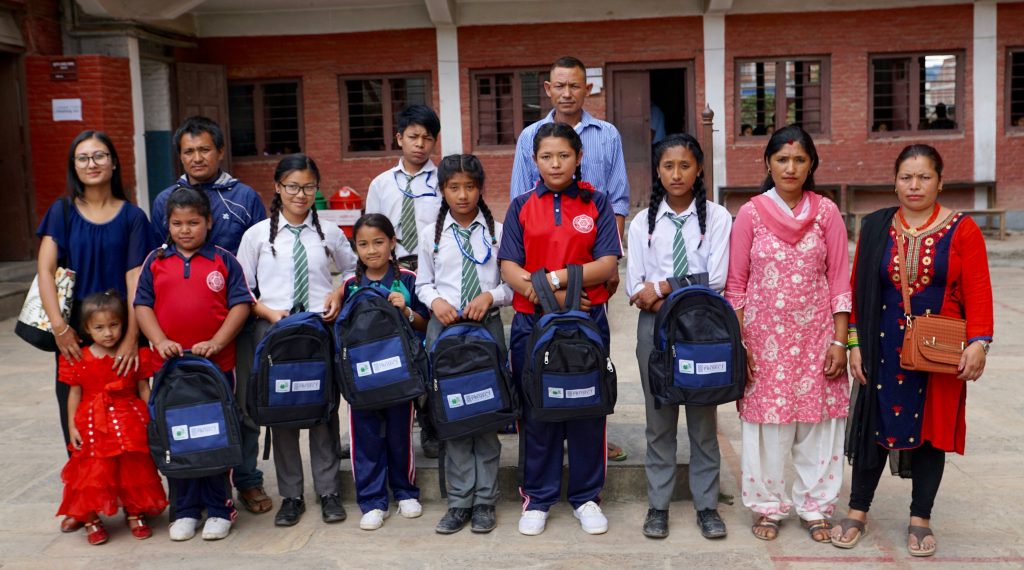
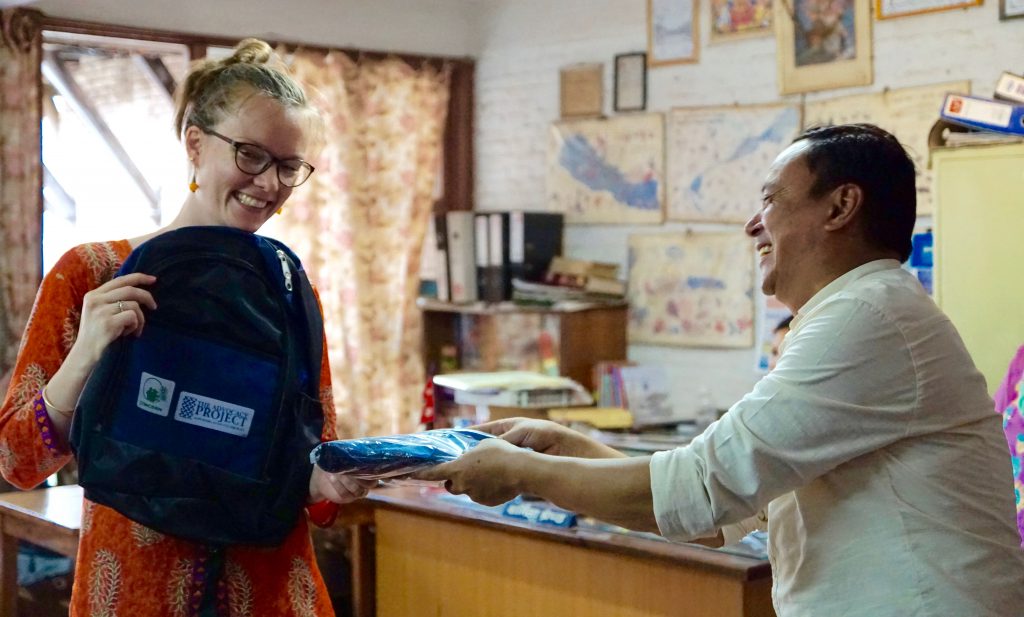
2 Comments
Corinne Cummings
August 8, 2018
Hi there Lara — I have to say this is one of my favorite blog posts that you have written thus far during your Fellowship. There is a great deal of passion in your words, and I enjoyed reading about the importance of prioritizing shoes above all else. You make good points about second-hand items and how there is no market due to the natural wear and tear that they go through in a year. Additionally, I agree further effort should be placed on increasing the public school’s education standard rather than making private schools more convenient. Also, the statistics were very interesting to read — it made your case more compelling. You are doing great work Lara; I am looking forward to hearing more about your progress with the kids going to school. And great pictures too — the last one of you holding the backpack is beautiful. Take care. Best, Corinne
Princia Vas
August 8, 2018
Great pictures, Lara! Your post definitely left a good impression on me. Thank you for all your amazing work. More power to you!